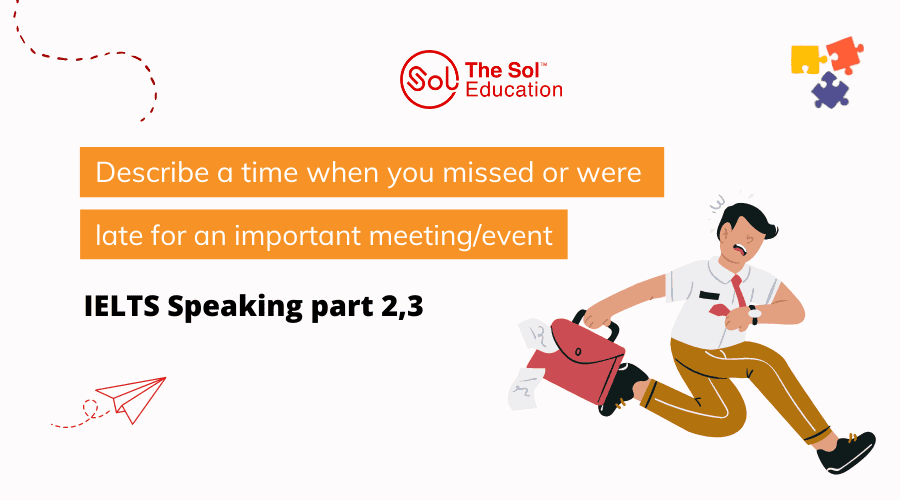Đã bao giờ bạn bị trễ một buổi họp hoặc một sự kiện quan trọng chưa? Nếu gặp câu hỏi này trong phần thi IELTS Speaking part 2, bạn sẽ trả lời như thế nào? Cùng tham khảo câu trả lời của SOL cho đề bài Describe a time when you missed or were late for an important meeting/event và chuẩn bị thật tốt cho phần thi IELTS Speaking của bạn nhé.

Describe a time when you missed or were late for an important meeting/event
You should say:
A couple of months ago, I experienced a rather unfortunate event when I missed an important group meeting for a school project. It was scheduled to take place on a Friday afternoon, and I had been looking forward to it as we needed to finalize our project's presentation and submit it to our teacher.
However, on that particular day, I got caught up in a traffic jam on my way to school. There was an unexpected heavy rain, and the roads were flooded, causing a significant delay in public transportation. I checked the weather forecast in the morning, but it didn't predict such severe conditions. Due to the unforeseen circumstances, I couldn't make it to the meeting on time, and I arrived nearly 40 minutes late.
By the time I reached the meeting venue, my teammates had already started without me. I felt immensely disappointed in myself as I had always been punctual and responsible in group activities. I knew that my absence could have a negative impact on our project's progress and the overall team dynamics. Upon explaining my situation to my teammates, they were understanding, but I still felt a sense of guilt and regret for not being there when they needed me the most. I quickly caught up with the discussion, but I couldn't help feeling that I had let them down.
This experience taught me the importance of planning ahead and considering unexpected factors that could affect my schedule. Since then, I have become more cautious and proactive in managing my time and transportation to avoid similar incidents in the future.
Well, I consider myself a punctual person. I value the importance of being on time for various commitments, whether it's for work, social gatherings, or personal appointments. Being punctual reflects respect for others' time and demonstrates a sense of responsibility.
Absolutely, I believe being on time is essential. Punctuality shows professionalism and reliability in both personal and professional settings. It allows for smooth and efficient operations, as well as building trust and positive impressions with others. Being on time also helps to avoid unnecessary stress and disruptions for oneself and those involved.
I do my best to always avoid being late. However, there may be unforeseen circumstances or occasional exceptions that might cause a delay. In such cases, I ensure to communicate promptly and apologize if I am unable to be on time.
From my observations, people may be late for meetings or appointments due to a variety of reasons. These reasons can include traffic congestion, unexpected emergencies, poor time management, or underestimating the time required to reach the destination. In some cases, cultural norms may also play a role, where punctuality might not be as strictly adhered to.
In my country, Vietnam, punctuality is generally valued, but it can vary among individuals and situations. In formal settings or business environments, being on time is usually emphasized. However, in more casual or social gatherings, there might be a more relaxed approach to punctuality. It is essential to consider the context and the people involved.
In my opinion, time management skills can be both innate and developed over time. Some individuals might naturally possess good time management skills, while others may need to cultivate and improve them through practice and self-awareness. By setting goals, prioritizing tasks, and creating efficient routines, anyone can enhance their time management abilities and improve productivity. Personal discipline and continuous self-improvement play a significant role in honing these skills.
Để làm tốt phần thi IELTS Speaking, bạn chỉ nên tham khảo các câu trả lời trên của SOL để xem cách diễn đạt ý, từ vựng hoặc ý tưởng chứ đừng học thuộc và bê nguyên nội dung vào bài thi của mình nhé. Và luôn phải tìm hiểu thật kỹ Tiêu chí chấm điểm của một bài thi IELTS Speaking. Hãy luyện tập bằng cách ghi âm lại phần nói của mình và nghe lại, đây là một cách rất hữu ích để luyện speaking và tìm ra điểm chưa tốt của mình luôn.
Ngoài ra, bạn có thể tham khảo thêm một số bài viết dưới đây của SOL để có thể nói tốt hơn:
